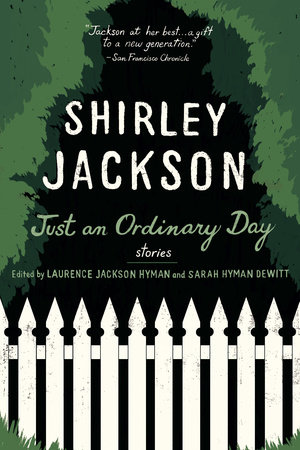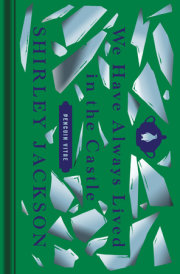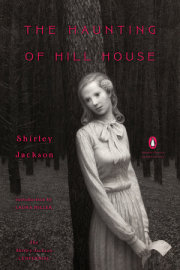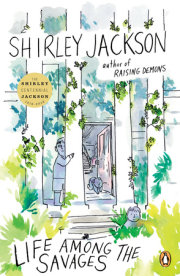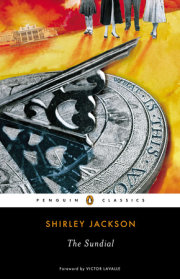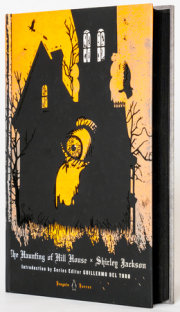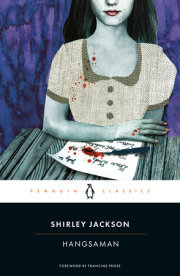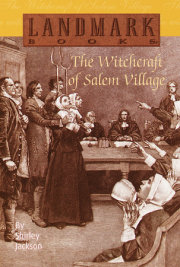“Jackson at her best: plumbing the extraordinary from the depths of mid-twentieth-century common. [Just an Ordinary Day] is a gift to a new generation.”—San Francisco Chronicle
Acclaimed in her own time for her short story “The Lottery” and her novel The Haunting of Hill House—classics ranking with the work of Edgar Allan Poe—Shirley Jackson blazed a path for contemporary writers with her explorations of evil, madness, and cruelty. Soon after her untimely death in 1965, Jackson’s children discovered a treasure trove of previously unpublished and uncollected stories, many of which are brought together in this remarkable collection. Here are tales of torment, psychological aberration, and the macabre, as well as those that display her lighter touch with humorous scenes of domestic life. Reflecting the range and complexity of Jackson’s talent, Just an Ordinary Day reaffirms her enduring influence and celebrates her singular voice, rich with magic and resonance.
Praise for Shirley Jackson
“[Jackson’s] work exerts an enduring spell.”—Joyce Carol Oates
“Shirley Jackson’s stories are among the most terrifying ever written.”—Donna Tartt
“An amazing writer . . . If you haven’t read [Jackson] you have missed out on something marvelous.”—Neil Gaiman
“Shirley Jackson is unparalleled as a leader in the field of beautifully written, quiet, cumulative shudders.”—Dorothy Parker
“An author who not only writes beautifully but who knows what there is, in this world, to be scared of.”—Francine Prose
“The world of Shirley Jackson is eerie and unforgettable.”—A. M. Homes
“Jackson enjoyed notoriety and commercial success within her lifetime, and yet it still hardly seems like enough for a writer so singular. When I meet readers and other writers of my generation, I find that mentioning her is like uttering a holy name.”—Victor LaValle
Acclaimed in her own time for her short story “The Lottery” and her novel The Haunting of Hill House—classics ranking with the work of Edgar Allan Poe—Shirley Jackson blazed a path for contemporary writers with her explorations of evil, madness, and cruelty. Soon after her untimely death in 1965, Jackson’s children discovered a treasure trove of previously unpublished and uncollected stories, many of which are brought together in this remarkable collection. Here are tales of torment, psychological aberration, and the macabre, as well as those that display her lighter touch with humorous scenes of domestic life. Reflecting the range and complexity of Jackson’s talent, Just an Ordinary Day reaffirms her enduring influence and celebrates her singular voice, rich with magic and resonance.
Praise for Shirley Jackson
“[Jackson’s] work exerts an enduring spell.”—Joyce Carol Oates
“Shirley Jackson’s stories are among the most terrifying ever written.”—Donna Tartt
“An amazing writer . . . If you haven’t read [Jackson] you have missed out on something marvelous.”—Neil Gaiman
“Shirley Jackson is unparalleled as a leader in the field of beautifully written, quiet, cumulative shudders.”—Dorothy Parker
“An author who not only writes beautifully but who knows what there is, in this world, to be scared of.”—Francine Prose
“The world of Shirley Jackson is eerie and unforgettable.”—A. M. Homes
“Jackson enjoyed notoriety and commercial success within her lifetime, and yet it still hardly seems like enough for a writer so singular. When I meet readers and other writers of my generation, I find that mentioning her is like uttering a holy name.”—Victor LaValle
Praise for Just an Ordinary Day
“Jackson at her best: plumbing the extraordinary from the depths of mid-twentieth-century common. [Just an Ordinary Day] is a gift to a new generation.”—San Francisco Chronicle
Praise for Shirley Jackson
“[Jackson’s] work exerts an enduring spell.”—Joyce Carol Oates
“Shirley Jackson’s stories are among the most terrifying ever written.”—Donna Tartt
“An amazing writer . . . If you haven’t read [Jackson] you have missed out on something marvelous.”—Neil Gaiman
“Shirley Jackson is unparalleled as a leader in the field of beautifully written, quiet, cumulative shudders.”—Dorothy Parker
“An author who not only writes beautifully but who knows what there is, in this world, to be scared of.”—Francine Prose
“The world of Shirley Jackson is eerie and unforgettable.”—A. M. Homes
“Jackson enjoyed notoriety and commercial success within her lifetime, and yet it still hardly seems like enough for a writer so singular. When I meet readers and other writers of my generation, I find that mentioning her is like uttering a holy name.”—Victor LaValle
“Jackson at her best: plumbing the extraordinary from the depths of mid-twentieth-century common. [Just an Ordinary Day] is a gift to a new generation.”—San Francisco Chronicle
Praise for Shirley Jackson
“[Jackson’s] work exerts an enduring spell.”—Joyce Carol Oates
“Shirley Jackson’s stories are among the most terrifying ever written.”—Donna Tartt
“An amazing writer . . . If you haven’t read [Jackson] you have missed out on something marvelous.”—Neil Gaiman
“Shirley Jackson is unparalleled as a leader in the field of beautifully written, quiet, cumulative shudders.”—Dorothy Parker
“An author who not only writes beautifully but who knows what there is, in this world, to be scared of.”—Francine Prose
“The world of Shirley Jackson is eerie and unforgettable.”—A. M. Homes
“Jackson enjoyed notoriety and commercial success within her lifetime, and yet it still hardly seems like enough for a writer so singular. When I meet readers and other writers of my generation, I find that mentioning her is like uttering a holy name.”—Victor LaValle
THE SMOKING ROOM
HE WAS TALLER THAN I had imagined him. And noisier. Here I was, all by myself, downstairs in the dormitory smoking room with my typewriter, and all of a sudden there was this terrific crash and sort of sizzle, and I turned around and there he was.
“Can’t you be a little quieter?” I said. “I’m trying to work.”
He just stood there, with smoke rolling off his head. “This is as quietly as I can do it,” he said apologetically. “It takes a lot of explosive power, you know.”
“Well, explode somewhere else,” I said. “Men aren’t allowed in here.”
“I know,” he said.
I turned around to get a good look at him. He was still smoking a little, but otherwise he seemed quite a charming young man. The horns were barely noticeable, and he was wearing pointed patent leather shoes that covered his cloven hoofs. He seemed to be waiting for me to make conversation.
“You must be the devil,” I said politely, and added: “I presume.”
“Yes,” he said, pleased. “I am the devil.”
“Where’s your tail?” I demanded. He blushed and made a vague gesture with his hand.
“Circumstances…” he murmured. He came over to the table where I was working. “What’re you doing?” he asked.
“I’m writing a paper,” I said.
“Let’s see.” He reached over to the typewriter and I shoved his hand away, getting quite a nasty burn from it, too.
“Mind your own business,” I told him.
He sat down meekly. “Look,” he said, “do you have an extra cigarette?”
I threw the pack over to him and watched him light one with the tip of his finger. My hand was all inflamed where I had touched him, and it hurt.
I held out my hand to him. “You oughtn’t to treat people like that,” I said. “It makes enemies.”
He looked at my hand sympathetically, then murmured over it, and the burn vanished. “That’s better,” I said.
We sat back and smoked for a minute, looking at each other. He was a good-looking guy.
“By the way,” I said finally, “do you mind telling me what you’re here for?”
“This is a college, isn’t it?”
I looked at him for a minute, but he didn’t seem to mean anything nasty, so I said: “You are at present in the smoking room of the largest girls’ dormitory on the campus of State University, and the housemother will raise hell if she finds you here.”
He began to laugh, and I realized that my choice of words had been a little silly, to say the least.
“I’d like to meet this housemother,” he said.
I tried to imagine what that would be like, and gave up. “She’s the closest thing to you you’ll find on earth,” I said earnestly.
He raised his eyebrows, and then suddenly seemed to think of something, because he reached into a pocket and pulled out a piece of paper.
“I wonder if you’d mind signing this?” he asked casually.
I picked up the paper. “May I read it first?”
He shrugged. “It isn’t important, but go ahead.”
I read: “‘This gives the devil my soul,’” and a space was left blank for my name. “This isn’t awfully legal,” I said.
He looked anxiously over my shoulder. “Isn’t it?” he said. “What’s wrong with it?”
“Well, obviously!” I threw the paper down on the table and pointed at it scornfully. “Who’s ever going to think that holds in a court of law? No witnesses, a thousand loopholes for a smart lawyer…”
He had picked up the paper and was frowning over it miserably. “It’s always been perfectly all right before,” he said.
“Well, I’m just surprised at your methods of doing business, that’s all. No court would even look at it.”
“Look,” he said. “We’ll make out another contract… one you think is all right. I don’t want to do this thing wrong, after all.”
I thought. “All right,” I said. “I’ll make one up. Mind you, I’m not awfully sure of the legal terminology, but I think I can manage.”
“Go ahead,” he said. “If it suits you, it suits me.”
I pulled the paper out of the typewriter and found a carbon and two new sheets.
He looked at the carbon suspiciously.
“What’s that?”
“I’m making two copies,” I told him. “I’ve got to keep one myself. That makes it binding.”
He continued to regard me suspiciously while I worked over the contract.
“How long is this contract good for?” I asked at once.
“Oh, eternity,” he said easily.
I finally finished and took the sheets out of the typewriter. Due to the fact that my knowledge of legal documents is restricted to the notices the dean sends out about poor grades, the contract was just a little confused. It read:
I (here a space was left blank for a name), hereinafter to be known as the party of the first part, do hereby sell and consign my soul, hereinafter to be known as the party of the second part, to the custody and careful watchfulness of (here another space was left blank), hereinafter to be known as the party of the third part, who does hereby swear and promise the sum of one dollar in return, also other unnamed considerations, admitting and conceding that it is a fair and just bargain, and no complaints afterward; this agreement to be binding, by mutual consent of the parties concerned, in any court of law, wherever conducted, (signed) (witnessed)
The devil read it twice. “I don’t understand it,” he said.
“It says the same thing as yours did,” I told him, “except that it’s more binding.” I pointed over his shoulder. “You see all those things about the parties of the first and second parts? And about the court of law? That all makes it legal.”
“Well, sign it, then,” he said.
I thought. “We need a witness,” I said. “I’ll go upstairs and get my roommate.”
I left before he could say anything. My roommate was asleep.
“Look, Bobbie,” I said. I shook her. She turned over and said, “Go away.”
“Bobbie,” I said, “you’ve got to come and witness a contract.”
“What the hell,” Bobbie said.
“I’ve got the devil waiting downstairs.”
“Let him wait,” Bobbie said. She had both eyes open but she wouldn’t move. I rolled her out of bed and stood her up. “Come on,” I said. “He’ll get impatient.”
“Signing contracts with the devil,” Bobbie said in disgust. “At three in the morning. How’s a person ever going to get any sleep.”
“Come on!” I said.
Bobbie sat down on the edge of her bed. “If he’s been waiting all these thousands of years,” she said, “he can wait until I get some lipstick on.”
By the time I got her downstairs, the devil had smoked four more of my cigarettes. He got up when we entered and bowed very low to Bobbie.
“Charmed,” he said.
Bobbie smiled at him invitingly. “Hello,” she said.
“Come on, you two,” I told them, “I’ve got to get this over with and get back to work.”
“What do I have to do?” Bobbie said, looking at the devil out of the corner of her eye.
“Just sign,” the devil said, taking her arm to lead her over to the table.
Bobbie let out a yell that ought to have waked the housemother and the whole dormitory. The devil backed away and began to apologize, but Bobbie stood there rubbing her arm and glaring.
“Look,” she said belligerently, “I’m not fooling around with any guy sets fire to you when he touches you.” The devil looked at Bobbie’s arm and made the burn go away, but after that Bobbie kept the table between them. I took up the contract.
“I’ll sign first,” I said. I wrote my name quickly in the second blank and handed the paper to the devil.
“You have to sign, too,” I said.
“Where?” He looked blankly at the paper. I showed him the first place and handed him my pen. He blushed, and looked from me to Bobbie. “I’m afraid…” he began, “do you mind if…” he shrugged and made an X in the space. “I never learned…” he said apologetically. Bobbie’s jaw dropped and she just stood there until I kicked her in the ankle.
“Sign here,” I said, and she signed in the witness space.
Then the devil and I signed again at the bottom, and signed the duplicate the same way, and I handed him one sheet and kept the other.
“Now,” I said as casually as I could, “I guess I owe you a dollar.”
“What for?” he said.
“Bobbie,” I said rapidly, “run upstairs and borrow a buck from someone.”
“What the hell,” Bobbie said. But she turned around and started up the stairs.
“Well,” said the devil, rubbing his hands, “what can I do for you now?”
I began to polish my nails on my hand. “Let’s see,” I said. “I’ll start out with an A in Chemistry 186, the power to be invisible when I come in after hours, a date with the captain of the football team for the senior ball—”
“Throw in something for me,” said Bobbie, coming through the door.
“Let’s see,” I said, “give her—”
“A date with that blond guy,” said Bobbie, “you know.” She handed me a dollar.
“I guess that’s about all,” I said to the devil.
“Except, of course,” Bobbie put in, “except for a couple of hundred thousand dollars.”
“You shall have all those things,” the devil promised eagerly.
“Oh, yes,” I said. “And you get this out of it.” I handed him the dollar.
“What’s this for?” he asked.
I looked at the contract. “That’s for your soul,” I said.
The devil looked at his contract. “Your soul,” he said.
“No.” I showed him the contract. “Where you signed, it says you give me your soul for the sum of one dollar, also other unnamed considerations. Those would be the cigarettes of mine you smoked.”
“And getting me out of bed,” Bobbie added.
The devil read the contract again. Then he began to stamp his feet, and flames came out of his mouth. Bobbie and I looked at each other.
“Golly,” she said. “What a date this guy would be!”
Just then the devil seemed to get a little pale, and he backed up against the wall, staring in back of us. Bobbie and I turned around, and there was the housemother. She stood in the doorway, in a bathrobe, with curlpapers on her hair, and she was an awe-inspiring sight.
She looked at the devil. “Young man,” she said, “what are you doing here?”
“Ma’am…” the devil began.
“You’re a fire hazard,” she snapped.
“Yes’m,” the devil said.
“Leave at once,” she said ominously, “before I report you to the dean of women.”
The devil cast one dreadful look at Bobbie and me, and then tried to vanish in a puff of smoke. All he succeeded in, however, was a weak sizzle, and then he was gone.
“All right,” said the housemother. Then she turned to Bobbie and me.
“Well?” she said.
“Look,” Bobbie began.
“You see, it was like this—” I said.
“Hmph,” said the housemother. “Devils, indeed!” And she went back to bed.
HE WAS TALLER THAN I had imagined him. And noisier. Here I was, all by myself, downstairs in the dormitory smoking room with my typewriter, and all of a sudden there was this terrific crash and sort of sizzle, and I turned around and there he was.
“Can’t you be a little quieter?” I said. “I’m trying to work.”
He just stood there, with smoke rolling off his head. “This is as quietly as I can do it,” he said apologetically. “It takes a lot of explosive power, you know.”
“Well, explode somewhere else,” I said. “Men aren’t allowed in here.”
“I know,” he said.
I turned around to get a good look at him. He was still smoking a little, but otherwise he seemed quite a charming young man. The horns were barely noticeable, and he was wearing pointed patent leather shoes that covered his cloven hoofs. He seemed to be waiting for me to make conversation.
“You must be the devil,” I said politely, and added: “I presume.”
“Yes,” he said, pleased. “I am the devil.”
“Where’s your tail?” I demanded. He blushed and made a vague gesture with his hand.
“Circumstances…” he murmured. He came over to the table where I was working. “What’re you doing?” he asked.
“I’m writing a paper,” I said.
“Let’s see.” He reached over to the typewriter and I shoved his hand away, getting quite a nasty burn from it, too.
“Mind your own business,” I told him.
He sat down meekly. “Look,” he said, “do you have an extra cigarette?”
I threw the pack over to him and watched him light one with the tip of his finger. My hand was all inflamed where I had touched him, and it hurt.
I held out my hand to him. “You oughtn’t to treat people like that,” I said. “It makes enemies.”
He looked at my hand sympathetically, then murmured over it, and the burn vanished. “That’s better,” I said.
We sat back and smoked for a minute, looking at each other. He was a good-looking guy.
“By the way,” I said finally, “do you mind telling me what you’re here for?”
“This is a college, isn’t it?”
I looked at him for a minute, but he didn’t seem to mean anything nasty, so I said: “You are at present in the smoking room of the largest girls’ dormitory on the campus of State University, and the housemother will raise hell if she finds you here.”
He began to laugh, and I realized that my choice of words had been a little silly, to say the least.
“I’d like to meet this housemother,” he said.
I tried to imagine what that would be like, and gave up. “She’s the closest thing to you you’ll find on earth,” I said earnestly.
He raised his eyebrows, and then suddenly seemed to think of something, because he reached into a pocket and pulled out a piece of paper.
“I wonder if you’d mind signing this?” he asked casually.
I picked up the paper. “May I read it first?”
He shrugged. “It isn’t important, but go ahead.”
I read: “‘This gives the devil my soul,’” and a space was left blank for my name. “This isn’t awfully legal,” I said.
He looked anxiously over my shoulder. “Isn’t it?” he said. “What’s wrong with it?”
“Well, obviously!” I threw the paper down on the table and pointed at it scornfully. “Who’s ever going to think that holds in a court of law? No witnesses, a thousand loopholes for a smart lawyer…”
He had picked up the paper and was frowning over it miserably. “It’s always been perfectly all right before,” he said.
“Well, I’m just surprised at your methods of doing business, that’s all. No court would even look at it.”
“Look,” he said. “We’ll make out another contract… one you think is all right. I don’t want to do this thing wrong, after all.”
I thought. “All right,” I said. “I’ll make one up. Mind you, I’m not awfully sure of the legal terminology, but I think I can manage.”
“Go ahead,” he said. “If it suits you, it suits me.”
I pulled the paper out of the typewriter and found a carbon and two new sheets.
He looked at the carbon suspiciously.
“What’s that?”
“I’m making two copies,” I told him. “I’ve got to keep one myself. That makes it binding.”
He continued to regard me suspiciously while I worked over the contract.
“How long is this contract good for?” I asked at once.
“Oh, eternity,” he said easily.
I finally finished and took the sheets out of the typewriter. Due to the fact that my knowledge of legal documents is restricted to the notices the dean sends out about poor grades, the contract was just a little confused. It read:
I (here a space was left blank for a name), hereinafter to be known as the party of the first part, do hereby sell and consign my soul, hereinafter to be known as the party of the second part, to the custody and careful watchfulness of (here another space was left blank), hereinafter to be known as the party of the third part, who does hereby swear and promise the sum of one dollar in return, also other unnamed considerations, admitting and conceding that it is a fair and just bargain, and no complaints afterward; this agreement to be binding, by mutual consent of the parties concerned, in any court of law, wherever conducted, (signed) (witnessed)
The devil read it twice. “I don’t understand it,” he said.
“It says the same thing as yours did,” I told him, “except that it’s more binding.” I pointed over his shoulder. “You see all those things about the parties of the first and second parts? And about the court of law? That all makes it legal.”
“Well, sign it, then,” he said.
I thought. “We need a witness,” I said. “I’ll go upstairs and get my roommate.”
I left before he could say anything. My roommate was asleep.
“Look, Bobbie,” I said. I shook her. She turned over and said, “Go away.”
“Bobbie,” I said, “you’ve got to come and witness a contract.”
“What the hell,” Bobbie said.
“I’ve got the devil waiting downstairs.”
“Let him wait,” Bobbie said. She had both eyes open but she wouldn’t move. I rolled her out of bed and stood her up. “Come on,” I said. “He’ll get impatient.”
“Signing contracts with the devil,” Bobbie said in disgust. “At three in the morning. How’s a person ever going to get any sleep.”
“Come on!” I said.
Bobbie sat down on the edge of her bed. “If he’s been waiting all these thousands of years,” she said, “he can wait until I get some lipstick on.”
By the time I got her downstairs, the devil had smoked four more of my cigarettes. He got up when we entered and bowed very low to Bobbie.
“Charmed,” he said.
Bobbie smiled at him invitingly. “Hello,” she said.
“Come on, you two,” I told them, “I’ve got to get this over with and get back to work.”
“What do I have to do?” Bobbie said, looking at the devil out of the corner of her eye.
“Just sign,” the devil said, taking her arm to lead her over to the table.
Bobbie let out a yell that ought to have waked the housemother and the whole dormitory. The devil backed away and began to apologize, but Bobbie stood there rubbing her arm and glaring.
“Look,” she said belligerently, “I’m not fooling around with any guy sets fire to you when he touches you.” The devil looked at Bobbie’s arm and made the burn go away, but after that Bobbie kept the table between them. I took up the contract.
“I’ll sign first,” I said. I wrote my name quickly in the second blank and handed the paper to the devil.
“You have to sign, too,” I said.
“Where?” He looked blankly at the paper. I showed him the first place and handed him my pen. He blushed, and looked from me to Bobbie. “I’m afraid…” he began, “do you mind if…” he shrugged and made an X in the space. “I never learned…” he said apologetically. Bobbie’s jaw dropped and she just stood there until I kicked her in the ankle.
“Sign here,” I said, and she signed in the witness space.
Then the devil and I signed again at the bottom, and signed the duplicate the same way, and I handed him one sheet and kept the other.
“Now,” I said as casually as I could, “I guess I owe you a dollar.”
“What for?” he said.
“Bobbie,” I said rapidly, “run upstairs and borrow a buck from someone.”
“What the hell,” Bobbie said. But she turned around and started up the stairs.
“Well,” said the devil, rubbing his hands, “what can I do for you now?”
I began to polish my nails on my hand. “Let’s see,” I said. “I’ll start out with an A in Chemistry 186, the power to be invisible when I come in after hours, a date with the captain of the football team for the senior ball—”
“Throw in something for me,” said Bobbie, coming through the door.
“Let’s see,” I said, “give her—”
“A date with that blond guy,” said Bobbie, “you know.” She handed me a dollar.
“I guess that’s about all,” I said to the devil.
“Except, of course,” Bobbie put in, “except for a couple of hundred thousand dollars.”
“You shall have all those things,” the devil promised eagerly.
“Oh, yes,” I said. “And you get this out of it.” I handed him the dollar.
“What’s this for?” he asked.
I looked at the contract. “That’s for your soul,” I said.
The devil looked at his contract. “Your soul,” he said.
“No.” I showed him the contract. “Where you signed, it says you give me your soul for the sum of one dollar, also other unnamed considerations. Those would be the cigarettes of mine you smoked.”
“And getting me out of bed,” Bobbie added.
The devil read the contract again. Then he began to stamp his feet, and flames came out of his mouth. Bobbie and I looked at each other.
“Golly,” she said. “What a date this guy would be!”
Just then the devil seemed to get a little pale, and he backed up against the wall, staring in back of us. Bobbie and I turned around, and there was the housemother. She stood in the doorway, in a bathrobe, with curlpapers on her hair, and she was an awe-inspiring sight.
She looked at the devil. “Young man,” she said, “what are you doing here?”
“Ma’am…” the devil began.
“You’re a fire hazard,” she snapped.
“Yes’m,” the devil said.
“Leave at once,” she said ominously, “before I report you to the dean of women.”
The devil cast one dreadful look at Bobbie and me, and then tried to vanish in a puff of smoke. All he succeeded in, however, was a weak sizzle, and then he was gone.
“All right,” said the housemother. Then she turned to Bobbie and me.
“Well?” she said.
“Look,” Bobbie began.
“You see, it was like this—” I said.
“Hmph,” said the housemother. “Devils, indeed!” And she went back to bed.
Copyright © 2009 by Shirley Jackson. All rights reserved. No part of this excerpt may be reproduced or reprinted without permission in writing from the publisher.
About
“Jackson at her best: plumbing the extraordinary from the depths of mid-twentieth-century common. [Just an Ordinary Day] is a gift to a new generation.”—San Francisco Chronicle
Acclaimed in her own time for her short story “The Lottery” and her novel The Haunting of Hill House—classics ranking with the work of Edgar Allan Poe—Shirley Jackson blazed a path for contemporary writers with her explorations of evil, madness, and cruelty. Soon after her untimely death in 1965, Jackson’s children discovered a treasure trove of previously unpublished and uncollected stories, many of which are brought together in this remarkable collection. Here are tales of torment, psychological aberration, and the macabre, as well as those that display her lighter touch with humorous scenes of domestic life. Reflecting the range and complexity of Jackson’s talent, Just an Ordinary Day reaffirms her enduring influence and celebrates her singular voice, rich with magic and resonance.
Praise for Shirley Jackson
“[Jackson’s] work exerts an enduring spell.”—Joyce Carol Oates
“Shirley Jackson’s stories are among the most terrifying ever written.”—Donna Tartt
“An amazing writer . . . If you haven’t read [Jackson] you have missed out on something marvelous.”—Neil Gaiman
“Shirley Jackson is unparalleled as a leader in the field of beautifully written, quiet, cumulative shudders.”—Dorothy Parker
“An author who not only writes beautifully but who knows what there is, in this world, to be scared of.”—Francine Prose
“The world of Shirley Jackson is eerie and unforgettable.”—A. M. Homes
“Jackson enjoyed notoriety and commercial success within her lifetime, and yet it still hardly seems like enough for a writer so singular. When I meet readers and other writers of my generation, I find that mentioning her is like uttering a holy name.”—Victor LaValle
Acclaimed in her own time for her short story “The Lottery” and her novel The Haunting of Hill House—classics ranking with the work of Edgar Allan Poe—Shirley Jackson blazed a path for contemporary writers with her explorations of evil, madness, and cruelty. Soon after her untimely death in 1965, Jackson’s children discovered a treasure trove of previously unpublished and uncollected stories, many of which are brought together in this remarkable collection. Here are tales of torment, psychological aberration, and the macabre, as well as those that display her lighter touch with humorous scenes of domestic life. Reflecting the range and complexity of Jackson’s talent, Just an Ordinary Day reaffirms her enduring influence and celebrates her singular voice, rich with magic and resonance.
Praise for Shirley Jackson
“[Jackson’s] work exerts an enduring spell.”—Joyce Carol Oates
“Shirley Jackson’s stories are among the most terrifying ever written.”—Donna Tartt
“An amazing writer . . . If you haven’t read [Jackson] you have missed out on something marvelous.”—Neil Gaiman
“Shirley Jackson is unparalleled as a leader in the field of beautifully written, quiet, cumulative shudders.”—Dorothy Parker
“An author who not only writes beautifully but who knows what there is, in this world, to be scared of.”—Francine Prose
“The world of Shirley Jackson is eerie and unforgettable.”—A. M. Homes
“Jackson enjoyed notoriety and commercial success within her lifetime, and yet it still hardly seems like enough for a writer so singular. When I meet readers and other writers of my generation, I find that mentioning her is like uttering a holy name.”—Victor LaValle
Praise
Praise for Just an Ordinary Day
“Jackson at her best: plumbing the extraordinary from the depths of mid-twentieth-century common. [Just an Ordinary Day] is a gift to a new generation.”—San Francisco Chronicle
Praise for Shirley Jackson
“[Jackson’s] work exerts an enduring spell.”—Joyce Carol Oates
“Shirley Jackson’s stories are among the most terrifying ever written.”—Donna Tartt
“An amazing writer . . . If you haven’t read [Jackson] you have missed out on something marvelous.”—Neil Gaiman
“Shirley Jackson is unparalleled as a leader in the field of beautifully written, quiet, cumulative shudders.”—Dorothy Parker
“An author who not only writes beautifully but who knows what there is, in this world, to be scared of.”—Francine Prose
“The world of Shirley Jackson is eerie and unforgettable.”—A. M. Homes
“Jackson enjoyed notoriety and commercial success within her lifetime, and yet it still hardly seems like enough for a writer so singular. When I meet readers and other writers of my generation, I find that mentioning her is like uttering a holy name.”—Victor LaValle
“Jackson at her best: plumbing the extraordinary from the depths of mid-twentieth-century common. [Just an Ordinary Day] is a gift to a new generation.”—San Francisco Chronicle
Praise for Shirley Jackson
“[Jackson’s] work exerts an enduring spell.”—Joyce Carol Oates
“Shirley Jackson’s stories are among the most terrifying ever written.”—Donna Tartt
“An amazing writer . . . If you haven’t read [Jackson] you have missed out on something marvelous.”—Neil Gaiman
“Shirley Jackson is unparalleled as a leader in the field of beautifully written, quiet, cumulative shudders.”—Dorothy Parker
“An author who not only writes beautifully but who knows what there is, in this world, to be scared of.”—Francine Prose
“The world of Shirley Jackson is eerie and unforgettable.”—A. M. Homes
“Jackson enjoyed notoriety and commercial success within her lifetime, and yet it still hardly seems like enough for a writer so singular. When I meet readers and other writers of my generation, I find that mentioning her is like uttering a holy name.”—Victor LaValle
Author
Excerpt
THE SMOKING ROOM
HE WAS TALLER THAN I had imagined him. And noisier. Here I was, all by myself, downstairs in the dormitory smoking room with my typewriter, and all of a sudden there was this terrific crash and sort of sizzle, and I turned around and there he was.
“Can’t you be a little quieter?” I said. “I’m trying to work.”
He just stood there, with smoke rolling off his head. “This is as quietly as I can do it,” he said apologetically. “It takes a lot of explosive power, you know.”
“Well, explode somewhere else,” I said. “Men aren’t allowed in here.”
“I know,” he said.
I turned around to get a good look at him. He was still smoking a little, but otherwise he seemed quite a charming young man. The horns were barely noticeable, and he was wearing pointed patent leather shoes that covered his cloven hoofs. He seemed to be waiting for me to make conversation.
“You must be the devil,” I said politely, and added: “I presume.”
“Yes,” he said, pleased. “I am the devil.”
“Where’s your tail?” I demanded. He blushed and made a vague gesture with his hand.
“Circumstances…” he murmured. He came over to the table where I was working. “What’re you doing?” he asked.
“I’m writing a paper,” I said.
“Let’s see.” He reached over to the typewriter and I shoved his hand away, getting quite a nasty burn from it, too.
“Mind your own business,” I told him.
He sat down meekly. “Look,” he said, “do you have an extra cigarette?”
I threw the pack over to him and watched him light one with the tip of his finger. My hand was all inflamed where I had touched him, and it hurt.
I held out my hand to him. “You oughtn’t to treat people like that,” I said. “It makes enemies.”
He looked at my hand sympathetically, then murmured over it, and the burn vanished. “That’s better,” I said.
We sat back and smoked for a minute, looking at each other. He was a good-looking guy.
“By the way,” I said finally, “do you mind telling me what you’re here for?”
“This is a college, isn’t it?”
I looked at him for a minute, but he didn’t seem to mean anything nasty, so I said: “You are at present in the smoking room of the largest girls’ dormitory on the campus of State University, and the housemother will raise hell if she finds you here.”
He began to laugh, and I realized that my choice of words had been a little silly, to say the least.
“I’d like to meet this housemother,” he said.
I tried to imagine what that would be like, and gave up. “She’s the closest thing to you you’ll find on earth,” I said earnestly.
He raised his eyebrows, and then suddenly seemed to think of something, because he reached into a pocket and pulled out a piece of paper.
“I wonder if you’d mind signing this?” he asked casually.
I picked up the paper. “May I read it first?”
He shrugged. “It isn’t important, but go ahead.”
I read: “‘This gives the devil my soul,’” and a space was left blank for my name. “This isn’t awfully legal,” I said.
He looked anxiously over my shoulder. “Isn’t it?” he said. “What’s wrong with it?”
“Well, obviously!” I threw the paper down on the table and pointed at it scornfully. “Who’s ever going to think that holds in a court of law? No witnesses, a thousand loopholes for a smart lawyer…”
He had picked up the paper and was frowning over it miserably. “It’s always been perfectly all right before,” he said.
“Well, I’m just surprised at your methods of doing business, that’s all. No court would even look at it.”
“Look,” he said. “We’ll make out another contract… one you think is all right. I don’t want to do this thing wrong, after all.”
I thought. “All right,” I said. “I’ll make one up. Mind you, I’m not awfully sure of the legal terminology, but I think I can manage.”
“Go ahead,” he said. “If it suits you, it suits me.”
I pulled the paper out of the typewriter and found a carbon and two new sheets.
He looked at the carbon suspiciously.
“What’s that?”
“I’m making two copies,” I told him. “I’ve got to keep one myself. That makes it binding.”
He continued to regard me suspiciously while I worked over the contract.
“How long is this contract good for?” I asked at once.
“Oh, eternity,” he said easily.
I finally finished and took the sheets out of the typewriter. Due to the fact that my knowledge of legal documents is restricted to the notices the dean sends out about poor grades, the contract was just a little confused. It read:
I (here a space was left blank for a name), hereinafter to be known as the party of the first part, do hereby sell and consign my soul, hereinafter to be known as the party of the second part, to the custody and careful watchfulness of (here another space was left blank), hereinafter to be known as the party of the third part, who does hereby swear and promise the sum of one dollar in return, also other unnamed considerations, admitting and conceding that it is a fair and just bargain, and no complaints afterward; this agreement to be binding, by mutual consent of the parties concerned, in any court of law, wherever conducted, (signed) (witnessed)
The devil read it twice. “I don’t understand it,” he said.
“It says the same thing as yours did,” I told him, “except that it’s more binding.” I pointed over his shoulder. “You see all those things about the parties of the first and second parts? And about the court of law? That all makes it legal.”
“Well, sign it, then,” he said.
I thought. “We need a witness,” I said. “I’ll go upstairs and get my roommate.”
I left before he could say anything. My roommate was asleep.
“Look, Bobbie,” I said. I shook her. She turned over and said, “Go away.”
“Bobbie,” I said, “you’ve got to come and witness a contract.”
“What the hell,” Bobbie said.
“I’ve got the devil waiting downstairs.”
“Let him wait,” Bobbie said. She had both eyes open but she wouldn’t move. I rolled her out of bed and stood her up. “Come on,” I said. “He’ll get impatient.”
“Signing contracts with the devil,” Bobbie said in disgust. “At three in the morning. How’s a person ever going to get any sleep.”
“Come on!” I said.
Bobbie sat down on the edge of her bed. “If he’s been waiting all these thousands of years,” she said, “he can wait until I get some lipstick on.”
By the time I got her downstairs, the devil had smoked four more of my cigarettes. He got up when we entered and bowed very low to Bobbie.
“Charmed,” he said.
Bobbie smiled at him invitingly. “Hello,” she said.
“Come on, you two,” I told them, “I’ve got to get this over with and get back to work.”
“What do I have to do?” Bobbie said, looking at the devil out of the corner of her eye.
“Just sign,” the devil said, taking her arm to lead her over to the table.
Bobbie let out a yell that ought to have waked the housemother and the whole dormitory. The devil backed away and began to apologize, but Bobbie stood there rubbing her arm and glaring.
“Look,” she said belligerently, “I’m not fooling around with any guy sets fire to you when he touches you.” The devil looked at Bobbie’s arm and made the burn go away, but after that Bobbie kept the table between them. I took up the contract.
“I’ll sign first,” I said. I wrote my name quickly in the second blank and handed the paper to the devil.
“You have to sign, too,” I said.
“Where?” He looked blankly at the paper. I showed him the first place and handed him my pen. He blushed, and looked from me to Bobbie. “I’m afraid…” he began, “do you mind if…” he shrugged and made an X in the space. “I never learned…” he said apologetically. Bobbie’s jaw dropped and she just stood there until I kicked her in the ankle.
“Sign here,” I said, and she signed in the witness space.
Then the devil and I signed again at the bottom, and signed the duplicate the same way, and I handed him one sheet and kept the other.
“Now,” I said as casually as I could, “I guess I owe you a dollar.”
“What for?” he said.
“Bobbie,” I said rapidly, “run upstairs and borrow a buck from someone.”
“What the hell,” Bobbie said. But she turned around and started up the stairs.
“Well,” said the devil, rubbing his hands, “what can I do for you now?”
I began to polish my nails on my hand. “Let’s see,” I said. “I’ll start out with an A in Chemistry 186, the power to be invisible when I come in after hours, a date with the captain of the football team for the senior ball—”
“Throw in something for me,” said Bobbie, coming through the door.
“Let’s see,” I said, “give her—”
“A date with that blond guy,” said Bobbie, “you know.” She handed me a dollar.
“I guess that’s about all,” I said to the devil.
“Except, of course,” Bobbie put in, “except for a couple of hundred thousand dollars.”
“You shall have all those things,” the devil promised eagerly.
“Oh, yes,” I said. “And you get this out of it.” I handed him the dollar.
“What’s this for?” he asked.
I looked at the contract. “That’s for your soul,” I said.
The devil looked at his contract. “Your soul,” he said.
“No.” I showed him the contract. “Where you signed, it says you give me your soul for the sum of one dollar, also other unnamed considerations. Those would be the cigarettes of mine you smoked.”
“And getting me out of bed,” Bobbie added.
The devil read the contract again. Then he began to stamp his feet, and flames came out of his mouth. Bobbie and I looked at each other.
“Golly,” she said. “What a date this guy would be!”
Just then the devil seemed to get a little pale, and he backed up against the wall, staring in back of us. Bobbie and I turned around, and there was the housemother. She stood in the doorway, in a bathrobe, with curlpapers on her hair, and she was an awe-inspiring sight.
She looked at the devil. “Young man,” she said, “what are you doing here?”
“Ma’am…” the devil began.
“You’re a fire hazard,” she snapped.
“Yes’m,” the devil said.
“Leave at once,” she said ominously, “before I report you to the dean of women.”
The devil cast one dreadful look at Bobbie and me, and then tried to vanish in a puff of smoke. All he succeeded in, however, was a weak sizzle, and then he was gone.
“All right,” said the housemother. Then she turned to Bobbie and me.
“Well?” she said.
“Look,” Bobbie began.
“You see, it was like this—” I said.
“Hmph,” said the housemother. “Devils, indeed!” And she went back to bed.
HE WAS TALLER THAN I had imagined him. And noisier. Here I was, all by myself, downstairs in the dormitory smoking room with my typewriter, and all of a sudden there was this terrific crash and sort of sizzle, and I turned around and there he was.
“Can’t you be a little quieter?” I said. “I’m trying to work.”
He just stood there, with smoke rolling off his head. “This is as quietly as I can do it,” he said apologetically. “It takes a lot of explosive power, you know.”
“Well, explode somewhere else,” I said. “Men aren’t allowed in here.”
“I know,” he said.
I turned around to get a good look at him. He was still smoking a little, but otherwise he seemed quite a charming young man. The horns were barely noticeable, and he was wearing pointed patent leather shoes that covered his cloven hoofs. He seemed to be waiting for me to make conversation.
“You must be the devil,” I said politely, and added: “I presume.”
“Yes,” he said, pleased. “I am the devil.”
“Where’s your tail?” I demanded. He blushed and made a vague gesture with his hand.
“Circumstances…” he murmured. He came over to the table where I was working. “What’re you doing?” he asked.
“I’m writing a paper,” I said.
“Let’s see.” He reached over to the typewriter and I shoved his hand away, getting quite a nasty burn from it, too.
“Mind your own business,” I told him.
He sat down meekly. “Look,” he said, “do you have an extra cigarette?”
I threw the pack over to him and watched him light one with the tip of his finger. My hand was all inflamed where I had touched him, and it hurt.
I held out my hand to him. “You oughtn’t to treat people like that,” I said. “It makes enemies.”
He looked at my hand sympathetically, then murmured over it, and the burn vanished. “That’s better,” I said.
We sat back and smoked for a minute, looking at each other. He was a good-looking guy.
“By the way,” I said finally, “do you mind telling me what you’re here for?”
“This is a college, isn’t it?”
I looked at him for a minute, but he didn’t seem to mean anything nasty, so I said: “You are at present in the smoking room of the largest girls’ dormitory on the campus of State University, and the housemother will raise hell if she finds you here.”
He began to laugh, and I realized that my choice of words had been a little silly, to say the least.
“I’d like to meet this housemother,” he said.
I tried to imagine what that would be like, and gave up. “She’s the closest thing to you you’ll find on earth,” I said earnestly.
He raised his eyebrows, and then suddenly seemed to think of something, because he reached into a pocket and pulled out a piece of paper.
“I wonder if you’d mind signing this?” he asked casually.
I picked up the paper. “May I read it first?”
He shrugged. “It isn’t important, but go ahead.”
I read: “‘This gives the devil my soul,’” and a space was left blank for my name. “This isn’t awfully legal,” I said.
He looked anxiously over my shoulder. “Isn’t it?” he said. “What’s wrong with it?”
“Well, obviously!” I threw the paper down on the table and pointed at it scornfully. “Who’s ever going to think that holds in a court of law? No witnesses, a thousand loopholes for a smart lawyer…”
He had picked up the paper and was frowning over it miserably. “It’s always been perfectly all right before,” he said.
“Well, I’m just surprised at your methods of doing business, that’s all. No court would even look at it.”
“Look,” he said. “We’ll make out another contract… one you think is all right. I don’t want to do this thing wrong, after all.”
I thought. “All right,” I said. “I’ll make one up. Mind you, I’m not awfully sure of the legal terminology, but I think I can manage.”
“Go ahead,” he said. “If it suits you, it suits me.”
I pulled the paper out of the typewriter and found a carbon and two new sheets.
He looked at the carbon suspiciously.
“What’s that?”
“I’m making two copies,” I told him. “I’ve got to keep one myself. That makes it binding.”
He continued to regard me suspiciously while I worked over the contract.
“How long is this contract good for?” I asked at once.
“Oh, eternity,” he said easily.
I finally finished and took the sheets out of the typewriter. Due to the fact that my knowledge of legal documents is restricted to the notices the dean sends out about poor grades, the contract was just a little confused. It read:
I (here a space was left blank for a name), hereinafter to be known as the party of the first part, do hereby sell and consign my soul, hereinafter to be known as the party of the second part, to the custody and careful watchfulness of (here another space was left blank), hereinafter to be known as the party of the third part, who does hereby swear and promise the sum of one dollar in return, also other unnamed considerations, admitting and conceding that it is a fair and just bargain, and no complaints afterward; this agreement to be binding, by mutual consent of the parties concerned, in any court of law, wherever conducted, (signed) (witnessed)
The devil read it twice. “I don’t understand it,” he said.
“It says the same thing as yours did,” I told him, “except that it’s more binding.” I pointed over his shoulder. “You see all those things about the parties of the first and second parts? And about the court of law? That all makes it legal.”
“Well, sign it, then,” he said.
I thought. “We need a witness,” I said. “I’ll go upstairs and get my roommate.”
I left before he could say anything. My roommate was asleep.
“Look, Bobbie,” I said. I shook her. She turned over and said, “Go away.”
“Bobbie,” I said, “you’ve got to come and witness a contract.”
“What the hell,” Bobbie said.
“I’ve got the devil waiting downstairs.”
“Let him wait,” Bobbie said. She had both eyes open but she wouldn’t move. I rolled her out of bed and stood her up. “Come on,” I said. “He’ll get impatient.”
“Signing contracts with the devil,” Bobbie said in disgust. “At three in the morning. How’s a person ever going to get any sleep.”
“Come on!” I said.
Bobbie sat down on the edge of her bed. “If he’s been waiting all these thousands of years,” she said, “he can wait until I get some lipstick on.”
By the time I got her downstairs, the devil had smoked four more of my cigarettes. He got up when we entered and bowed very low to Bobbie.
“Charmed,” he said.
Bobbie smiled at him invitingly. “Hello,” she said.
“Come on, you two,” I told them, “I’ve got to get this over with and get back to work.”
“What do I have to do?” Bobbie said, looking at the devil out of the corner of her eye.
“Just sign,” the devil said, taking her arm to lead her over to the table.
Bobbie let out a yell that ought to have waked the housemother and the whole dormitory. The devil backed away and began to apologize, but Bobbie stood there rubbing her arm and glaring.
“Look,” she said belligerently, “I’m not fooling around with any guy sets fire to you when he touches you.” The devil looked at Bobbie’s arm and made the burn go away, but after that Bobbie kept the table between them. I took up the contract.
“I’ll sign first,” I said. I wrote my name quickly in the second blank and handed the paper to the devil.
“You have to sign, too,” I said.
“Where?” He looked blankly at the paper. I showed him the first place and handed him my pen. He blushed, and looked from me to Bobbie. “I’m afraid…” he began, “do you mind if…” he shrugged and made an X in the space. “I never learned…” he said apologetically. Bobbie’s jaw dropped and she just stood there until I kicked her in the ankle.
“Sign here,” I said, and she signed in the witness space.
Then the devil and I signed again at the bottom, and signed the duplicate the same way, and I handed him one sheet and kept the other.
“Now,” I said as casually as I could, “I guess I owe you a dollar.”
“What for?” he said.
“Bobbie,” I said rapidly, “run upstairs and borrow a buck from someone.”
“What the hell,” Bobbie said. But she turned around and started up the stairs.
“Well,” said the devil, rubbing his hands, “what can I do for you now?”
I began to polish my nails on my hand. “Let’s see,” I said. “I’ll start out with an A in Chemistry 186, the power to be invisible when I come in after hours, a date with the captain of the football team for the senior ball—”
“Throw in something for me,” said Bobbie, coming through the door.
“Let’s see,” I said, “give her—”
“A date with that blond guy,” said Bobbie, “you know.” She handed me a dollar.
“I guess that’s about all,” I said to the devil.
“Except, of course,” Bobbie put in, “except for a couple of hundred thousand dollars.”
“You shall have all those things,” the devil promised eagerly.
“Oh, yes,” I said. “And you get this out of it.” I handed him the dollar.
“What’s this for?” he asked.
I looked at the contract. “That’s for your soul,” I said.
The devil looked at his contract. “Your soul,” he said.
“No.” I showed him the contract. “Where you signed, it says you give me your soul for the sum of one dollar, also other unnamed considerations. Those would be the cigarettes of mine you smoked.”
“And getting me out of bed,” Bobbie added.
The devil read the contract again. Then he began to stamp his feet, and flames came out of his mouth. Bobbie and I looked at each other.
“Golly,” she said. “What a date this guy would be!”
Just then the devil seemed to get a little pale, and he backed up against the wall, staring in back of us. Bobbie and I turned around, and there was the housemother. She stood in the doorway, in a bathrobe, with curlpapers on her hair, and she was an awe-inspiring sight.
She looked at the devil. “Young man,” she said, “what are you doing here?”
“Ma’am…” the devil began.
“You’re a fire hazard,” she snapped.
“Yes’m,” the devil said.
“Leave at once,” she said ominously, “before I report you to the dean of women.”
The devil cast one dreadful look at Bobbie and me, and then tried to vanish in a puff of smoke. All he succeeded in, however, was a weak sizzle, and then he was gone.
“All right,” said the housemother. Then she turned to Bobbie and me.
“Well?” she said.
“Look,” Bobbie began.
“You see, it was like this—” I said.
“Hmph,” said the housemother. “Devils, indeed!” And she went back to bed.
Copyright © 2009 by Shirley Jackson. All rights reserved. No part of this excerpt may be reproduced or reprinted without permission in writing from the publisher.
Back to Top
Notifications






